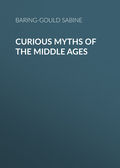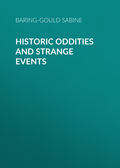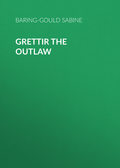
Baring-Gould Sabine
Arminell, Vol. 2
CHAPTER XXXI
HOW IT CAME ABOUT
“I wonder now,” said Mrs. Saltren to herself, “whatever has made the raspberry jam so mouldy? Was the fruit wet when it was picked? I cannot remember. If it was, it weren’t my fault, but the weather on which no one can depend. I wanted to send up some to Tryphœna Welsh, but now I can’t, unless I spoon off the mould on the top of one and fill up from the bottom of another. It is a pity and a waste of confidence and a sapping of faith when one goes, makes jam, and spends coals and sugar and a lot of perspiration, and gets nothing for it but mould an inch thick. I must send Tryphœna Welsh something, for if Giles, as he tells me, has gone to take up with writing for the papers, he’ll need the help of James, and there’s no way of getting at men’s hearts but through their stomachs. It was tiresome Giles writing to my brother and not saying a word to me about it. I could have told him James was not in town, so no need for him to address a letter to him at Shepherd’s Bush; he went after seeing us, to stay with one literary friend and then another, so he won’t have Giles’ letter till he returns to town. That accounts for my boy receiving no answer. Giles never saw him when he was here, which was tiresome. It is vexing too about the hams. I’d have sent one up to James, if they had not been spoiled, along of the knuckles being outside the bags, so that the flies walked in as they might at a house door. I pickled those hams in treacle and ale and juniper. I made paper bags for them, and what more could I do? It was no fault of mine if the hams got spoiled. It was the fault of the hams being too big for my paper bags, so that the bone stuck out. And then the weather – it was encouraging to the flies. After the raspberry jam and the hams, one wants comfort. I’ll get a drop.”
But before she had reached the corner cupboard, the door opened, and her husband came in, looking more strange, white, and wild than ever. He staggered to the table, rolling in his walk as if he were drunk, and held to the furniture to stay himself, fearing to take a step unsupported. His face was so livid, his eyes so full of something like terror, that a thrill of fear ran through Mrs. Saltren – she thought he was mad.
“What is it, Saltren? Why do you look at me in that fashion? I was not going to my cupboard for anything but my knitting. I said to myself, I will knit a warm jersey for Giles against the winter, and I put the pins and the wool in there. Now don’t look so queer. Are you ill?”
“Marianne,” he said slowly, then drew a long breath that sounded hoarsely in his throat as he inhaled it, “Marianne, you are avenged.”
“What do you mean? Are you referring to the hams or the raspberry jam?”
“Marianne,” he repeated, “the word has come to pass. The hand has been stretched forth and has smitten the evil doer. The mighty is cast out of his seat and laid even with the dust.”
“I don’t know what you’re a-talking about, Stephen. I concern myself about common things, and about prophecy no more than I do about moonshine. The jams get mouldy and the hams ain’t fit to eat.”
“Did I not tell you, Marianne, of what I saw and heard that Sabbath day?”
“I gave no heed to it.”
“It is fulfilled. The purposes of heaven fulfil themselves in a wonderful and unexpected way when we are least awaiting it. He is dead.”
“Who is dead?”
“Lord Lamerton.”
“Lord Lamerton!” Marianne Saltren started.
“How is it that? Where, Stephen, and when?”
“He is lying dead beneath the cliff.”
“Good heavens! How came that about?”
“He was cast down by the hand of an avenging justice. You have been avenged.”
“I – I have nothing to complain of – to have avenged on Lord Lamerton.”
“Nothing of late, but you told me of the dishonour, of the wrong – ”
Mrs. Saltren uttered a cry of horror.
“Stephen, for God’s sake! – you do not mean? – you know, you know that I named no names.”
“I knew, Marianne, to whom you referred. I knew it at once. Then I understood why you gave your son the Christian name he bears.”
“Oh, Stephen, it was not that.”
“Yes, Marianne, it was. It all hangs together. I saw how he, Lord Lamerton, was constrained to make much of the boy, to spend money on him, to educate and make a gentleman of him, and take him into his house.”
“Stephen! Stephen! this is all a mistake.”
“No, Marianne, it is no mistake. I see it all as plainly as I saw the angel flying in the midst of heaven bearing the Everlasting Gospel in his right hand, which he cast into the water before me.”
“I was talking nonsense. I am – Oh, Stephen! What did you say? – he – Lord Lamerton is not dead?”
“He is dead. He is lying dead on the path.”
Mrs. Saltren was seized with a fit of trembling, as if an ague were come over her. She stared at her husband, terror stricken, and could not speak. A horrible thought, a sickening dread, had swept over her, and she shrank from asking a question which might receive an answer confirming her half-formulated fears.
“The judgment has tarried long, but the sentence has overtaken the sinner at last. Now, after all, he has been made to suffer for what he once did to you. He cast you down, and with like measure has it been meted to him. He is cast down.”
“He did nothing to me.”
“You are ready to forgive him now, and to forget the past, because you are a Christian. But eternal justice never forgets, it waits and watches, and when least expected, strikes down.”
“Oh, Stephen! What are you thinking of? You listened to my idle talk. You fancy that Lord Lamerton was – was the father of Giles, but he was not. Indeed, indeed he was not.”
“He was not!” echoed the captain, standing stiffly with outstretched arms and clenched fists, a queer ungainly figure, jointless, as if made of wooden sticks. “You yourself told me that he was.”
“I named no names. Indeed I never said he was – why, Stephen, how could he have been, when you know as well as I do, that he was out of England for three years at that time; he was attaché as they call it at the embassy in – I forget, some German Court, whilst I was at Orleigh with the dowager Lady Lamerton.”
The captain stood still, thinking; as one frozen and fast to the spot.
“Besides,” put in the woman, with a flicker of her old inordinate vanity and falsehood, in spite of her present fear, “you think very bad of me if you suppose I’d have took up with any one less than a viscount.”
A long silence ensued, in which the tick of the clock sounded loudly and harshly.
“Marianne,” he said at last, hoarsely.
“It is all your fault and stupidity,” said his wife hastily. “You have no judgment, and a brain on fire with religious craze. If you would but behave like an ordinary, sensible man and think reasonably, you would never have fallen into this mistake. You had only to think a moment reasonably, and you’d know that it was not, and could not be a man, and he only the honourable, and like to be no better than a baron, many hundred miles away at a foreign court, and the postage then not twopence ha’penny as ’tis now.”
“Marianne,” said Saltren again hoarsely, and he took a step nearer to her, and grasped her wrist. “Marianne, answer me,” Saltren spoke with a wild flicker in his eyes as though jack-o’-lanterns were dancing over those deep mysterious pools, “as you will have to answer at the great day of account – is Giles not the son of Lord Lamerton?”
“Of course not, I never said so. Who but a fool would suppose he was, and a week’s post and foreign languages between? He never left – Munich I think it was, but it may have been Munchausen, and I never left Orleigh all the three years. Besides – I never said it was. I named no names.”
Now a shudder ran through Saltren, a convulsive quake, but it was over instantaneously. Then, with his iron hand he pressed the woman’s wrist downwards.
“Kneel,” he said, “kneel.”
“You are hurting me, Stephen! let go!”
“Kneel,” he repeated, “kneel.”
He forced her from her feet to her knees, before him, she was too frightened to disobey; and her vain efforts to parry reproof, and lay the blame on him, had been without success, he had not noticed even the mean evasions.
“Marianne,” he said solemnly, in his deepest, most tremulous tones. “Tell me – who was the father of Giles?”
“That I will not – never – no, I cannot tell.”
“You shall, I will hold you here, with my hand clenched, and not let you go – No, never, not all the coming night, not all next day, all the night following – for ever, and ever, until you confess.”
She stooped towards the floor, to hide her face from his searching eyes, with the lambent flame in them that frightened her. Then she looked furtively towards the window, and next to the door, into the back kitchen, seeking means of escape.
“It is in vain for you to try to get away,” said the captain slowly. “Here I hold you, and tighten my grasp, till you scream out the truth. They used to do that in England. They slipped the hands in iron gloves and the feet in iron boots, and screwed till the blood ran out of fingers and foot-ends, and the criminal told the truth. So will I screw the truth out of you, out of your hands. You cannot escape. Was the father of Giles a nobleman?”
“He was not the highest of all – not a duke.”
“What was he then?”
She was silent, and strove to twist her hands away. He held both now. He compressed his clutch. She cried out, “I cannot bear this.”
“What was his title?”
“You are hurting me, Stephen.”
“Was he a nobleman at all?”
With hesitation, and another writhe to get away – “N – no.”
“Then, all that story you told of the deception practised upon you was a lie?”
“Not a lie – it was a joke. James was not such a fool as you, he took it as such. But you – ”
Then Stephen Saltren drew his wife to her feet, and strode to the door, dragging her with him. She screamed. She supposed he was about to kill her; but he turned, and said gloomily, “I will not hurt you, I want to show you what you have done – with your joke.”
He forced open the door, and drew her through the garden, out at the wicket gate, along the path up the coombe. There were two ways thence to Orleigh Park, one down the coombe to the main valley and high-road, and round a shoulder of hill; the other way by a steep climb up a zig-zag path in the side of the hill to the top of the crag, thence over a stretch of some thirty acres of furzy down into the plantations and so into the park through them. The tortuous ascent began at the cottage, Chillacot, but Saltren drew his wife past the point whence it rose to where the evening sun cast the black shadow of the crag or “cleave” across the glen, and there – lying on broken, fallen stones, with his hands outstretched, his face to the clear sky, lay Lord Lamerton, dead.
Marianne Saltren cowered back, she was too frightened by what she saw to care to approach; but her husband’s vice-like grasp did not relax for all her weeping and entreaties. He compelled her to come close to the fallen man.
His finger ends buried themselves in her wrists, and checked her pulse, that her hands became numb, and tingled.
He remained silent, for long, looking at the dead man, his own face scarcely less white, his muscles hardly less rigid, his features as set, and more drawn. There was no sunlight in the narrow valley where they stood under the great slate cleave, but above at the edge of the opposite hill were gorse bushes so covered with golden bloom that they seemed to be but one yellow flower, and on them the evening sun rested lovingly. Above, ghost-like in the blue sky, was a filmy disc – the moon, only perceivable from the deep valley, unseen by those who stood in the sunlight. The rooks were congregating in the wood at the bottom of the valley. That wood was a favourite resort to which the birds from several rookeries came every evening before set of sun, and chattered incessantly, and made as much noise as if they were members of the House of Commons discussing Irish matters. The sound issuing from that wood was strident like the rattle of a lawn-mower.
A blue-bottle fly was buzzing round the dead man. Saltren saw it, it made him uneasy; he let go one of his wife’s hands and with his disengaged hand drew his kerchief from his throat, a black silk one, and whisked it to and fro, to drive away the insect. “I cannot tell,” he said, “heaven knows. If it had not been for what you said, for your amusing joke, he might now be living. I cannot tell. The ways of Providence are dark. We are but instruments used, and not knowing for what purpose used. I cannot tell.”
He put the kerchief to his face and wiped it.
“I was yonder,” he pointed upwards with his chin, and then whisked his kerchief in the direction of the top of the cliff. “I was on the down, and when I least expected it, and at the moment when I was not thinking of him, I saw him striding towards me, and when he came up with me, he was out of breath. I was standing then at the edge of the cleave. I was looking down into the coombe at my house, and I was in a dream. When I saw him, I did not stir. I would not go to meet him. I let him come to me. And when I saw him turn out of his path and cross the down to me, then I knew the hand out of the clouds pointed the way, and he followed not knowing to what it pointed. He came close to me, to the very edge of the rock, and I did not budge one inch. He had been walking fast, and spoke pantingly, in a strangely mixed manner, and he asked some question about Giles. I do not remember what he asked, but at the sound of his voice and of that name, then the fire that was in my heart broke out, and I was blind and mad. My blood roared in my ears and head, as the sea roars and beats against the coast in a gale. Then I shouted out all I knew; I told him that Giles was his son, and that God would call him to account for his sins and his injustice and cruelties; and he was as one amazed, that neither spoke nor moved till I raised my hand to strike him on the breast to rouse him to answer, and then, before ever I touched him, he stepped back and went over the cleave.”
Then Marianne Saltren uttered a piercing shriek and tossed, and put her teeth to her husband’s hand to bite at the fingers and force them to relax their grasp.
“There are people coming,” she screamed, “I will tell them all that you killed him. Let me go. I cannot bear your touch.”
“You accursed woman, you daughter of the old father of lies,” said Saltren between his teeth, and the bubbles formed in his mouth as he spoke through his teeth, “I will not let you go till you have told me who was the father of Giles.”
Suddenly, however, he let go her wrist, but she had her liberty for a moment only. He had drawn his black silk neckerchief round her throat, and twisted the ends about his fingers under her chin.
“Marianne, I killed him. Yet not I. I am but the executioner under Providence. What heaven judges that I carry out. And now I do not care if I kill you, after I killed him. I will kill you, I will strangle you, unless you confess who was the father of Giles.”
He was capable of doing what he threatened.
“It were best for you,” he said, “wicked woman, to suffer here a little pain, than burn eternally. Confess, or I will send you into the world beyond.” She was quiet for a moment, desisting from her useless struggle.
“You will release me if I say?”
“I will do so.”
“He was a wonderfully handsome man then, a very fine fellow, the handsomest I ever saw.”
“Who was he?”
“There were others besides me lost their hearts to him.”
“Who was he?”
“I hear voices below the house. People are coming. You will be taken and hung because you killed him.”
“Who was he?”
Saltren did not move a muscle. “Let them come, and they will find you dead also, beside him.”
“You cannot judge of what he was by what he is now.”
“His name?”
Again she looked to right and left, in spite of the grip under her chin, and made a start to escape, but instantly he tightened the kerchief and she became red as blood.
“Marianne,” said Saltren. “His name?”
He relaxed the pressure. She listened, no – she heard no voices, only mingled cawing of rooks and thumping of pulses in her ears.
“If you must know?”
“I must.”
“It was – Samuel Ceely.”
CHAPTER XXXII
A PLACE OF REFUGE
He thrust her away from him with an exclamation of disgust. Then he stooped. A tuft of meadow-sweet grew among the stones where the dead man lay, and its white flowers were full of pollen, and the pollen, shaken from them, had fallen, and formed a dust over the upturned face.
Captain Saltren drew his black silk kerchief over the dead man’s brow, and wiped away the powder, and as he did so was aware that the blue-bottle had returned; he heard its drone, he saw its glazed metallic back, as it flickered about the body. Then he turned and went away, but had not gone far before he halted and came back, for he thought of the insect. That fly teased his mind, it was as though it buzzed about his brain, then perched and ran over it, irritating the nerves with its hasty movement of the many feet, and the tap of its proboscis. He could not endure the thought of that fly – therefore he went back, and stood sweeping with his kerchief up and down over the face and then the hands, protecting the body against the blue-bottle.
He heard his wife running away, crying for help. He knew that before long she would have collected assistants to come to remove the dead body. They would find him there; and was it safe for him to be seen in close proximity to the man he had killed?
He knew that he ought to go. He had a horror of being there, alone with the corpse. Again he took a few steps to leave it, but, looking back over his shoulder, he saw the blue-bottle settle on the forehead, then run down along the nose to the lips of the dead man, and he went back to drive the creature away once more. Presently he heard voices, not those now of cawing rooks, but of men. But he could not stir from the place. He would be committing a sin, an unpardonable sin, a sin from which his soul could not cleanse itself by floods of penitential tears, were he to allow the blue-bottle to deposit its eggs between those dead lips. His mind was unsettled. Now and then only did he think of himself as endangered, and feel an impulse to escape; and yet the impulse was not strong enough to overcome his anxiety to protect the body. He did not consider the future, whether he had occasion to fear for himself, whether he would be put on his defence.
After a flood we find backwaters where promiscuous matter drifts in circles – straw, snags of wood, a dead sheep, a broken chair; so was it in the mind of Stephen Saltren. His ideas were thrown into confusion; thoughts and fancies, most varied and incongruous, jostled each other, without connection. The discovery that his wife had lied to him in the matter of the parentage of Giles and the guilt of Lord Lamerton, following on the excitement in which he had been through the encounter with his enemy, had sufficed to paralyse his judgment, and make his thoughts swerve about incoherently.
He was aware that he had committed a great mistake, he knew that his position was precarious; but his confidence in his vision, and the mission with which he was entrusted remained unshaken, and this confidence justified to his conscience the crime that he had committed, if, indeed, he had committed one. But in the gyration of thoughts in his brain, only one fact stood out clearly – that a blue-bottle fly menaced the corpse, and that it was his duty to drive the insect away.
He was engaged on this obligation, when a hand touched him, and on looking round he saw Patience Kite.
“Captain Saltren,” said the woman, “why are you here? I saw you both on top of the cleave, and I do know that he did not fall by chance. I will not tell of you.”
He looked at her with blank eyes.
“Others may have seen you besides myself. You must not be found here.”
“I am glad,” said he dreamily, talking to himself, not to her, “I am glad that I had, myself, no occasion against him. I thought I had, but I had not.”
“Come with me,” said Mrs. Kite, “folks are near at hand. I hear them.”
He looked wistfully at the dead face.
“I cannot,” he said.
“What! Do you want to be taken by the police?”
“I cannot – I am held by the blue-bottle.” In a moment she stooped, snapped her hands together and caught the fly.
“Now,” said Saltren, “I will follow. It was not I, I am but the miserable instrument. The hand did it that brought him my way, that led him to the edge, and that then laid hold of my arm.”
Patience caught him by the shoulder and urged him away.
“You must not be seen near the body. Take my advice and be off to Captain Tubb about some lime, and so establish an alibi.”
Saltren shook his head.
“If not, then come along with me. I will show you a hiding-place no one thinks of. Folks could not tell how to take it, when they did find me lying buried under the fallen chimney; but when I saw it was cracking, I made off through the dust, and none saw me escape. At the night-meeting some thought, when I stood on the table behind you, that I was a spirit. You can feel my grip on your arm, that I am in the flesh and hearty. I set fire to the tumbled thatch. It does good to scarce folks at times.”
She drew Saltren into the wood. From a vantage point on the other side of the valley from that of the crag, themselves screened from sight, they could see a cluster of men about the dead body of Lord Lamerton, and Mrs. Saltren gesticulating behind them.
“I wonder,” said Patience Kite, “whether that wife of yours be a fool or not? Your safety, I reckon, depends on her tongue. If she has sense, she will say she found the dead lord, as she was going to fetch water. If she’s a fool, she’ll let out about you. Did any one see you on the down?”
“I think Macduff went by some time before.”
“Yes – I saw’n go along. That was some while afore.”
Saltren said nothing. He was less concerned about his own safety than Mrs. Kite supposed. He was intently watching the men raise the dead body.
“It is a pity,” pursued Mrs. Kite, “because if you hadn’t been seen by Mr. Macduff, I might have sworn you a famous alibi, and made out you was helping me to move my furniture. Thomasine also, she’d ha’ sworn anything in reason to do you a good turn. What a sad job it was that you didn’t chuck over Macduff as well. But there – I won’t blame you. We none of us, as the parson says, do all those things we ought to do, but leave undone what we ought. Thomasine and I’d swear against Mr. Macduff, but I doubt it would do no good, as Mrs. Macduff keeps a victoria and drives about in it, and we don’t, so the judge would have respect to the witness of Macduff and disregard ours. And yet they say there is justice and righteousness in the world! – when our testimony would not be taken and Macduffs accepted, along of a victoria.”
She caught Saltren’s arm again, and led him further into the wood, along a path that seemed to be no path at all for a man to walk, but rather a run for a rabbit. The bushes closed over a mere track in the moss.
“I reckon,” muttered Patience, “there’ll be a rare fuss made about the death of his lordship; but how little account was made of that of young Tubb. That was a cruel loss to Thomasine and me. My daughter and he were sweethearts. Captain Tubb was going to take the boy on as a hand at the lime quarry; he could not earn twenty shillings in a trade, so he would get fifteen as a labourer. Well – he could have married and kept house on that. Either he and my girl would have lived with me or with his father. Macduff and Lord Lamerton spoiled the chance for me and them. I owe them both a grudge, and I thank you for paying off my score on his lordship. Macduff may wait. In fall I will make a clay figure of him, and stick pins in it, and give him rheumatic pains and spasms of the heart. Whatever parsons and doctors may say, I can do things which are not to be found in books, and there is more learning than is got by scholarship.”
Mrs. Kite paused and looked round.
“You’ve not been about in the woods, creeping on all fours as I have, through the coppice. I know my way even in the dark. I can tell it by the feel of the stems of oak. Where there is moss, that is the side to the sou’-west wind and rain. The other side is smooth. So one can get along in the dark. What a moyle there will be over the death of his lordship all because he was a lord, and there was nothing made of the death of Arkie, because he was nobody. There is no justice and righteousness in the world, or Mr. Macduff would be wearing bracelets now and expecting a hempen necklace. Here we are at my cottage that he and his lordship tore down.”
They emerged suddenly on the glade where stood the ruins. No one was visible. It remained as it had been left, save that the fallen rafters and walls were blackened by the smoke of the up-flaming thatch.
Patience did not tarry at the hovel, but led the way to the quarry edge.
“Do you see here,” she said, “you take hold of the ivy ropes, and creep along after me. It is not hard to do when you know the way. Miss Arminell first led me to the Owl’s Nest. One Sunday she came here, and holding the ivy, got along to the cave, and then let go the rope. I went after her; and when my house was being pulled down about my head, then I remembered the cave, and went to it in the same way. Since then I have moved most of my things I want, and Thomasine has helped me. But she couldn’t come till her foot was better, along the edge where we shall go. What I cannot carry we let down from above by a rope, and I draw them in to me with a crooked stick. I shall have to pay no ground rent for that habitation, and I defy Mr. Macduff to pull the roof down on me. It is a tidy, comfortable place, in the eye of the sun. What I shall do in winter I cannot tell, but it serves me well enough as a summer house. If I want to bake, I have my old oven in the back-kitchen. Now lay hold of the ivy bands and come after me. I will show you where you can lie hid when there is danger at Chillacot.”
Saltren followed her, and in a few minutes found himself in the cave. She had hung an old potato sack half-way down the hollow, and behind this she had made her bed and stored her treasures.
“No one can visit me whom I do not choose to receive,” said Mrs. Kite. “If I should see a face come round the corner, the way we came, I’d have but to give a thrust, as that you gave his lordship, and down he would go. Now I will return. You remain here. See, I crook the ivy chains over this prong of rock when I am here. Whatever you do, mind and do not let the chains fall away. If you do, you’re a prisoner till I release you. That is how Miss Arminell was caught. I’ll run and see what is going on, and bring you word.”
The old woman unhooked sufficient strands of ivy to support herself, and went lightly and easily along the face of the rock.
Saltren remained standing. He had his hands linked behind his back, and his head projecting. He had not recovered balance of mind; his thoughts were like hares in poachers’ gate-nets – entangled, leaping, turning over, and working themselves, in their efforts after freedom, into more inextricable entanglement. But one idea gradually formed itself distinctly in his mind – the idea that he had not been wronged by Lord Lamerton in the way in which he had supposed, and that, therefore, all personal feeling against him disappeared. But, in the confusion of his brain, he carried back this idea to a period before he discovered that he had been deceived by his wife into feeling this grudge, and he justified his action to himself; he satisfied himself that there could have been no private resentment in his conduct to his lordship when he lifted his hand against him, because twenty minutes later he discovered that there were no grounds for entertaining it. This consideration sufficed to dissipate the first sense of guilt that had stolen over him. Now he knelt down in the cave, at its entrance, and thanked heaven that no taint of personal animosity had entered into his motives and marred their purity. It was true that Lord Lamerton had thrown Saltren out of employ – he forgot that. It was true also that, as chairman of the board of directors of the railway, he had sought to force him to surrender his house and plot of land – he forgot that. It was true that at the time when he confronted Lord Lamerton, he believed that his domestic happiness had been destroyed by that nobleman – he forgot that also. He concluded that he had put forth his hand, acting under a divine impulse, and executing, not personal vengeance, but the sentence of heaven.
When a camel, heavy laden, is crossing the desert, the notion sometimes occurs to it that it is over-burdened, that its back is breaking, and it sullenly lies down on the sand. No blows will stir it – not even fire applied to its flanks; but the driver with much fuss goes to the side of the beast, and pretends to unburden it of – one straw. And that one straw he holds under the eye of the camel, which, satisfied that it has been sensibly relieved, gets up and shambles on. Our consciences are as easily satisfied when heavy burdened as the stupid camel. One straw – nay, the semblance, the shadow of a straw – taken from them contents us; we rise, draw a long breath, shake our sides, and amble on our way well pleased.
Lord Lamerton had been doomed by heaven for his guilt in the matter of Archelaus Tubb. Was it not written that he who had taken the life of another should atone therefor with his own life? Who was the cause of the lad’s death? Surely Lord Lamerton, who had ordered the destruction of the cottage. If the cottage had been left untouched, the chimney would not have fallen. Mr. Macduff was but the agent acting under the orders of his lordship, and the deepest stain of blood rested, not on the agent, but on his instigator and employer. Saltren had been on the jury when the inquest took place, and he had then seen clearly where the fault lay, and who was really guilty in the matter; but others, with the fear of man in them, had not received his opinion and consented to it, and so there had been a miscarriage of justice.







